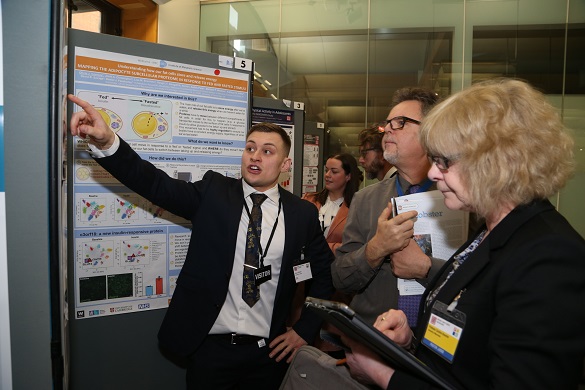There was success for University of Liverpool researchers who presented at the annual STEM for Britain parliamentary poster competition.
The event is designed to give members of both Houses of Parliament an insight into the outstanding research work being undertaken in UK universities by early-career researchers.
This year, three University researchers were shortlisted from hundreds of entries to attend the competition which is divided into five categories (biological and biomedical sciences, chemistry, engineering, mathematical sciences and physics).
Prizes are awarded to posters in each category that parliamentarians and judges consider the best at communicating the research to a lay audience.
Devon Crouch (below), a PhD student from the Department of Eye and Vision Science, was awarded the gold medal for his poster about using biomaterials to tackle glaucoma, the leading cause for irreversible blindness.
Devon’s poster showcased how he managed to manufacture a biomaterial scaffold that mimics the eye’s trabecular meshwork’s complex structure and exhibited the materials ability to support cell attachment and growth. This device offers the potential to be a novel regenerative treatment for glaucoma.
He said: “Stem for Britain was a once in a lifetime opportunity, that I am very grateful I got to be a part of it. I met so many interesting individuals, in fact too many to mention! The main thing I took away from the experience is that we, as PhD students, are really making a difference step by step to help our respective fields in every way we can. So all of us involved in research should often take a step back and realise the great work we are doing to mould the future and really make a change.”
Rebecca Evans (below), from the Department of Psychology, was awarded the Nutrition Society prize for her poster, in the biological and biosciences category, on the extent, nature and impact on adolescents of food marketing via videogame livestreaming platforms.
She said: “It was a brilliant experience – I would encourage other early-career researchers to apply. I really enjoyed discussing our research with a variety of interested experts and MPs. It was really exciting to have the opportunity to share our research in Parliament, particularly considering the policy implications of our work. It was also lovely to chat with the other finalists and hear about all of the inspiring research going on. Winning the Nutrition Society Prize was the perfect end to the day!”
Sean Edwards (below), a researcher in the Department of Mathematical Sciences, presented his poster on mathematical modelling of drug transport through oral tissues.
He said: “Wow! What a great day presenting a poster as a mathematics finalist for STEM for Britain 2023 in the Houses of Parliament. It was a brilliant opportunity to speak about my work on mathematical modelling of drug delivery across the oral mucosa and it was an honour to meet MPs and leaders of the scientific community.”
The Parliamentary and Scientific Committee runs STEM for Britain in collaboration with the Royal Academy of Engineering, the Royal Society of Chemistry, the Institute of Physics, the Royal Society of Biology, The Physiological Society, the Nutrition Society and the Council for the Mathematical Sciences, with sponsorship from Dyson Ltd, Clay Mathematics Institute, United Kingdom Research and Innovation, Warwick Manufacturing Group, AWE, British In Vitro Diagnostics Association, the Society of Chemical Industry, Institute of Biomedical Science, the Heilbronn Institute for Mathematical Research, and the Biochemical Society.
